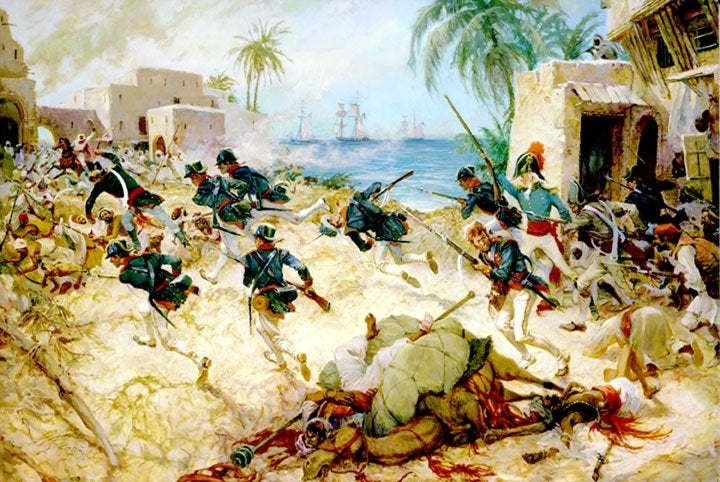I consider David Drake largely responsible for my ambition to write. As an enthusiast of history, I am impressed by where he finds inspiration for his novels- from the annals of human events. We need not try to conjure up something incredible purely off our own inspiration and energies. Great men and women have performed such deeds as stand paramount in recorded existence.
This alone does not justify why I seek to emulate the example Drake sets. Check his RCN novels. At the end of each, he includes the historical context for the events which transpired. And also note that he does not need to follow every single, precise detail. Rather he is selective and careful to the needs of his story.
In Cross the Stars, Drake explains in his notes how he didn’t, indeed couldn’t pull every little detail to make his own story. Instead he pulled specific elements he felt he could work with, and from that produced a story. A cruel cannibalistic cyclops becomes a rogue security system. Demi-goddesses alone on their islands become living breathing planets. Aloysius Hammer and his regiments of tanks become the very Gods ruling from high on Olympus.
It’s selective work, it requires practice and not a little thoughtful consideration, but it allows for us to draw from the world around us and create our own stories. Consider if you will, the story of Lt. Presley O’Bannon. Sent by the American government to force a change in Tripoli, he moved across several hundred miles of desert with his small detachment of Marines, a larger group of mercenaries, took the city of Derna by storm, and held it. For this, legend holds, he was given the Mameluke sword, a pattern of which Marine officers still wear today.
How is this series of events remembered best though? As the second line of the Marines’ Hymn: “To the shores of Tripoli.” It’s what works for that specific piece. If, however, we were trying to adapt that situation for our own purposes of writing fiction, what ought we to take?
Think of this as a writing exercise. Stories need conflict. Conflict allows the story to move forward. Austen had the budding romance between Jane and Mr. Darcy, whose personalities clashed at every opportunity. What occurred in Presley O’Bannon’s life which we can draw from?
-It’s the First Barbary War
-He’s installing a new Bey of Tripoli
-Has to recruit a force mercenaries
—The Mercenaries are a mixed group of religions and cultures
—-Some of those really hate each other’s guts
-O’Bannon must march 500 miles to his objective
—Supplies run low, causing mutiny and desertion
—Nobody is getting properly paid
-When they get to Derna, they are badly outnumbered 500 Marines and mercenaries versus 4,000 defenders
-The city must be stormed to capture it.
-After successfully capturing and defending the city of Derna, the polyglot force finds out that the State Department cut a deal with the sitting Bey that allows him to stay in power, negating their operation entirely.
That’s 5 main points, with a few sub-points which lend to the overall depth. From this we can extrapolate our own story. Instead of crossing a desert, the setting might be the depths of space, a mercenary force moving across the starlanes in a tramp freighter that’s crowded, short on supplies, and not everybody likes each other. Maybe the red-skinned Murtaghs from Beeblebrozx IIV don’t get along with the eye-stalk sporting multi-handed Goombahs of Tillian because they worship a purple idol and the Murtaghs are allergic to contact with purple objects. Amidst all this, we have a plucky young officer who is in way over his head trying to keep the peace, train his mercenaries, and get everybody safely to the battlefield so they can take out their aggression on the enemy.
That movement to contact is a single novel on it’s own. It affords us time to flesh out characters, flesh out the interpersonal conflicts where our readers find commonality and empathy with characters, and in general tell a whacking good story.
When our conglomerate of pissed off aliens and human Marines arrive at Yokel Station, their ultimate destiny, they have a hellacious fight taking it, followed by a siege as various supporters of the current Pasha, Smegma son of Pincock, tries to retake the transstellar shipping station they’ve captured. After repeated attempts, his forces finally admit they cannot retake the orbital facility and admit defeat.
Here you can add the state department lackey screwing them over. Or not. The choice is up to the author. They have to make that determination about whether or not it fits in the piece. Hell, write both and have an alpha reader give feedback about both. The option is there, use it.
We need not look to only events which have occurred over 200 years in the past. For our purposes, we can look to recent events, such as the seizing of british tankers by Iran. The hostile actions of a middle eastern power at a time when Britain is seeing a surge of patriotism and nationalism set a very proper stage chock full of conflict from which we can draw a story and plot it out.
What I outlined in the previous 3 paragraphs? I did that as I was typing it up. Are the paragraphs rough? Absolutely. I don’t need to make perfect details though. I need to get the basics down and move forward with writing. We can’t sell the stories we never finish.
May we find in the world around us the basis for our own stories. And may those we choose to commemorate with our work live on forever. Much as a Lieutenant of Marines has passed into immortality with those famed words “To the shores of Tripoli.”





10 responses to “Legends become Stories”
David Drake is responsible for me knowing there was such thing as military SF.
Likewise. I found _Hammer’s Slammers_ at the library, then Sterling/Pournelle _Prince of Mercenaries_ and _Falkenberg’s Legion_ , then the Warbots series, and never looked back.
I discovered Pournelle after Ringo and Drake, but I consider them my greatest joy from high school literature.
I freely admit to lifting history, and trimming or expanding it to suit my needs. If it happened over 300 years ago, it’s public domain, yes? 😉
In the end, all fiction is fanfiction. It’s just that sometimes the story that inspires it is reality.
Best of all, just because it’s in dispute doesn’t mean you can’t make it true if you file off the serial numbers!
I prefer SF and fantasy versions to historical fiction, because the knowledge that they are supposed to be the same person does color reading a dozen different Eleanor of Aquitaines even if the authors don’t contradict the known facts on the ground.
cough * Eliza and Mr Darcy * cough
Also, thank you for reminding me that I have some books to check out…
I love how David Gemmell rewrote history “as it should have been”. Like the Siege of Dros Delnoch is the Alamo, if the Texans had won. Or the Battle of Skeln Pass is Thermopylae if the Spartans hadn’t been slaughtered.
You gotta watch out for those things. Too much victory results in the reader seeing the hand of the author.
Well, his good guys always win in the end, but they don’t always survive the end of the novel.